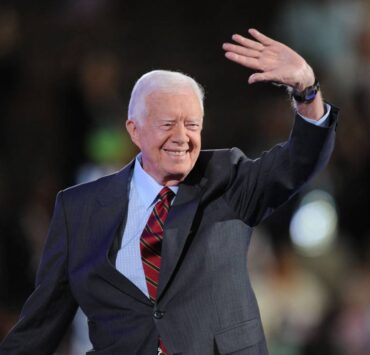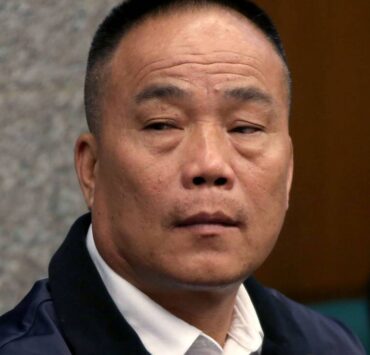Carter: Reaching out like Carpenter from Nazareth

(Editor’s Note: The Inquirer is reprinting this March 24, 1999 story, based from the author’s interview with former US President Jimmy Carter in Maragondon, Cavite.)
Clad in faded denims and a long-sleeved blue shirt of the working man, former US President Jimmy Carter was in his element laying cement blocks for a house that will soon be the home of a poor family in Maragondon, Cavite. A hammer dangled from his waist.
Like the thousands of foreign and Filipino volunteers, he too broiled in the Philippine sun and worked quietly and continuously, pausing only to wipe his sweat with a muddy towel. Burly Secret Service men made sure no one came near to ogle or make a fuss. But everyone was busy building anyway.
Former First Lady Rosalynn herself looked every inch a carpenter’s wife, doing her own share in building 250 houses in one week in Cavite, and several hundreds in other places, which is the goal of the Jimmy Carter Work Project ’99 (JCWP) for Habitat for Humanity in the Philippines.
The former president did take time out to meet another former president, Corazon Aquino, who came in work clothes and black Reeboks. He also went around to inspect the progress of work, dropping by the house the Inquirer was building for the Antic family, to move three Inquirer volunteers to another house which had few workers. The house Carter was building was behind the Inquirer’s.
Pres. Carter did honor an interview appointment with the Inquirer. There in one of the semi-finished houses (floor area: 30 sq. m.) the former White House occupant spoke about his experiences with JCWP-Habitat as well as on carpentry, Jesus Christ’s example, volunteerism and shelter as a human right.
“I have always loved carpentry,” Carter began. “As a young boy, I did carpentry with the Future Farmers of America, a high school program for farm boys.” Carter was raised in peanut-growing Plains, Georgia.
“Now I am a furniture maker,” he said proudly, obviously skipping the four years he was president of the world’s most powerful country.
Could he make a stool? “Oh, I make tables, beds, stools,” he answered. “We have a cabin in the mountains and I made the furniture for the whole house. I make things for my children, too. They’re basically handmade but I don’t hesitate to use machines. In my home in Georgia, I have a very complete woodworking shop with all the equipment that I need.” He also does not need assistants, he added.
When asked about his most unforgettable experience with JCWP-Habitat he answered: “We are on our 16th year so every year has been memorable. The most unforgettable are the homeowner-families. We get to know them, the children, their grandchildren. When we go back to the same place several years later they are there.”
There were difficulties too. “For three years it has been very hot. Many of our workers got ill. Last year, 1998, the temperature in Miami was 110 degrees Fahrenheit (40 degrees Centigrade). And yesterday (last Monday) many of the volunteers had to see the doctor. There is always a moderate number who don’t feel well.”
He also recalled the first year in New York when they were renovating an old apartment house. Several people were injured there.
And how do places compare? “We’ve built in Peru at an altitude of 13,000 feet. Three years ago, we were in Hungary where people never liked to do volunteer work because under the communist regime, they had to do volunteer work every Saturday or they go to prison. At that time we had volunteers from other countries.
“My wife Rosalynn and I got acquainted with fishermen living near the Danube River. On the last few days, the fishermen tied their boats by the river bank and came by to help us finish the houses. It was a good experience for the people of Hungary to learn volunteer work, and do it on their own initiative. If work is not forced it could be very pleasant.”
Carter even went to Nicaragua when the Sandinista regime was at war with the US-supported Contra rebels. Sandinista President Daniel Ortega received the former US president and his wife and drove them in his four-wheel drive. “Pres. Ortega laid bricks and helped put up the roof,” Carter recalled. “That was the first time I met him.”
They’ve had some problems with governments, Carter said, flashing a wide grin. “A few times, yes. When we were going to build a hundred houses in Mexico, the government was going to charge duty for the materials and tools we moved in. I called up the president of Mexico and he said, okay, they’d take care of it.”
Founded by Millard Fuller and his wife Linda, Habitat for Humanity is a nonstock, nonprofit group that aims to alleviate the housing problem of the world through volunteer work. Although it is not affiliated with one religious group, Habitat stands on a strong Christian foundation. It is ecumenical, meaning that people of all faiths are welcome to serve and be served.
The Maragondon site will be called Isaiah Ville. The name was inspired by the prophet’s promise (in Isaiah 25:17-25, the sign board said) of about “a new heaven and a new earth.” As one verse says: “They will build houses and dwell in them; they will plant crops and eat their fruit… The wolf and the lamb will eat together, the lion will eat straw like a fox.’’
So does the carpenter president think the churches are doing enough for housing for the poor? “No, they’re not,” Carter quickly replied. “I don’t see why every church, every mosque, every synagogue can’t build one house for one poor family in a year in their neighborhood. Even a small amount of money could help. The members could work on weekends.”
He spoke of the famous carpenter from Nazareth. “Jesus was a carpenter. He set out to give a good example by reaching out. Building homes for the poor is a project that would bring church members together. That is putting into action what we learned from Jesus Christ. Most people go to church on Sundays and learn about Christ but they don’t do anything about it.’’
The Carter administration would be remembered as high on pushing for human rights especially in countries with repressive governments. Carter was president when the Marcos regime was at its most oppressive. He never warmed up to Marcos. But human rights work is not only about censuring despots, Carter implied.
“Most of the time,” Carter explained, “we think of human rights when the government is persecuting the people. (In fact), when the people are deprived of a pleasant, productive and happy life, that is deprivation of human rights. Persons have the right to have food, shelter, some education, job opportunities, peace and absence of persecution.” The JCWP-Habitat project, Carter stressed, is human rights work.
JCWP is not all that keeps the former president busy. “That is only for one week in one year,” he said. But what a boost he gives to housing for the poor. The other 51 weeks he is busy with the Carter Center which runs programs that aim to strengthen democracy, peace, human rights and development work all over the world.
But JCWP-Habitat remains close to the Carter family’s heart. “My two sons are here,” he said beaming. “Chip is vice president of Friendship Force which is building two houses. My youngest son Jeff and his wife are here, too.”
And Amy, the little First Daughter who brightened up the White House? “Amy is going to have a baby in July so she can’t be here,” the father said. “But she has worked with Habitat, too.”
It’s all in the Carter family.

















